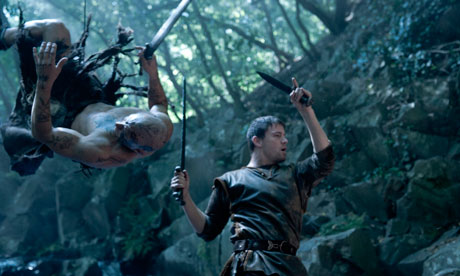
First published in 1954, The Eagle of the Ninth, Rosemary Sutcliff's novel for older children, is now regarded as a classic. Her title refers to the standard carried by the Ninth Legion of the Roman army that disappeared in the north of Britain in the second century AD, and it's the story of how the young Marcus Aquila later sets out to discover what happened to its leader, his father Flavius Aquila, and the 500 men he led. When the book appeared I had long passed the 12-16 age group at which it was aimed, though I was acquainted with an equally exciting, if less respectable yarn published exactly a decade earlier, also by the Oxford University Press: Captain WE Johns's Biggles – Charter Pilot.
In Johns's book (a first edition of which was recently sold on eBay for £42), the future Squadron Leader James Bigglesworth hires out his services for adventurous excursions to remote places, mostly working for Dr Duck, an eccentric, bespectacled scientist who wears a top hat and tailcoat. The aerial expedition that made the greatest impression on me took Biggles and Dr Duck to a Roman legion still occupying a post at an oasis in the Sahara. The tale came back to me vividly when Japanese soldiers were discovered 10 years after the second world war, still doing their duty on atolls around the Pacific, and it returned to my mind seeing The Eagle, Kevin Macdonald's accomplished screen version of Rosemary Sutcliff's novel. Inevitably, given the subject but also because like Macdonald's mountaineering docudrama Touching the Void and his The Last King of Scotland (an adult novel in the style of Victorian schoolboys' author GA Henty), The Eagle appeals to my older self while retaining what made my childhood reading so stirring.
Shot on location in Hungary (homeland of Macdonald's grandfather Emeric Pressburger) and Macdonald's native Scotland, the movie begins with Marcus Aquila (Channing Tatum) and a band of Roman legionnaires arriving in ancient Britain, the uncanny edge of the known world. He's come to take command of a garrison that's ill disciplined and low on morale. This first chapter is like a western in which a charismatic martinet gains the reluctant admiration of his troops by restoring their self-respect and courageously leading them in battle against hostile natives. One thinks especially of Raoul Walsh's They Died With Their Boots On, where Colonel Custer takes command of a dispirited US Seventh Cavalry, and in fact The Eagle ends up echoing Custer's Last Stand and the contest for the regimental flag. There's a particularly fine battle scene in which Marcus and his men form a testudo to confront the ferocious Brits, that concludes with him receiving near fatal wounds.
In the second part, Marcus recovers in the company of his elderly uncle (Donald Sutherland), who buys the British slave Esca (Jamie Bell) for him after Marcus has saved his life in a gladiatorial arena. Considered physically unfit for further military service and goaded by casual insults to his father's reputation from complacent Roman politicians, Marcus resolves to devote himself to his true purpose – the discovery of what happened to the Ninth Legion up in Caledonia, the recovery of the Eagle and the clearing of the family name. Accompanied by Esca, who speaks Pictish or whatever the language is called, he heads up beyond Hadrian's Wall on his dangerous quest. At this point The Eagle inevitably invites comparison with two recent movies that touch on the same subject of lost Romans in the gloaming on the barbarous banks of Clyde: the disastrous The Lost Legion and the passable Centurion. In every respect – the language, the characterisation, the staging of the action sequences and the historical resonance – The Eagle is superior.
In Centurion someone says: "Is this Hadrian's big fucking plan? A wall?" There's nothing like that in Jeremy Brock's well-considered script for The Eagle, and the area north of the wall is an awesome place, austerely bone-chilling in its climate, majestic in its landscape. It's superbly lit by Anthony Dod Mantle, a British cinematographer based in Denmark, who has worked on a remarkable range of films including Lars von Trier's Antichrist and Danny Boyle's Slumdog Millionaire. In this setting the relationship between Marcus and Esca grows from mutual suspicion to respect. As they come into conflict with the unyielding local population and discover the secrets of the past, they are for a while forced to reverse their roles as master and slave in order to survive. Inevitably, in the absence of more traditional romantic interest, there's a certain unobtrusive homoerotic aspect to the relationship.
Without undue questioning The Eagle admirably embraces certain unfashionable virtues of what might be considered a Roman brand – duty, honour, filial piety. And it does so in the context of recreating a distant world (the production designer Michael Carlin, who worked on The Last King of Scotland, In Bruges and The Duchess, does a fine job on the historical ambience) and relating it to our own times. It has been the custom in post-second world war movies to cast British actors as Roman imperialists and American actors as their defiant opponents (as in Ben-Hur and Spartacus). But The Eagle is very specific in taking a more realistic view and identifying America as the new imperialists with the casting of Tatum, Sutherland and other north Americans as the Romans, and having that striking British actor Mark Strong adopt an American accent to play a key survivor of the Ninth that Marcus encounters in Scotland. A coda back in Rome concludes the film on a facile note generally absent elsewhere, but this is a minor flaw in a most enjoyable film.

